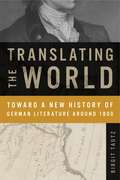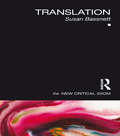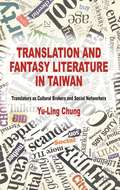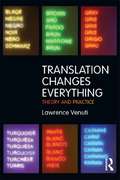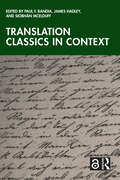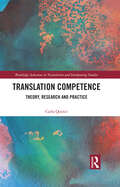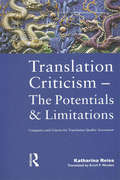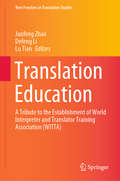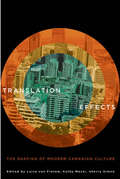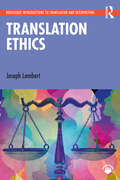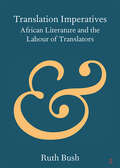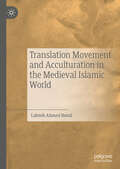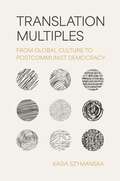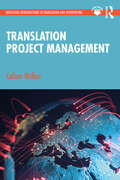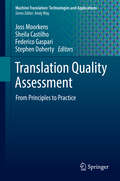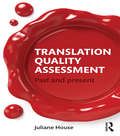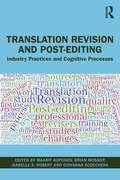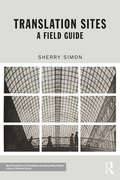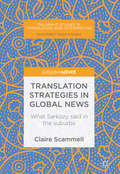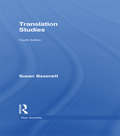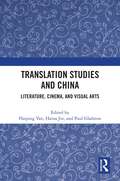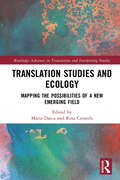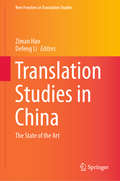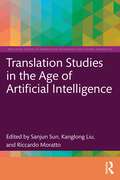- Table View
- List View
Translating the World: Toward a New History of German Literature Around 1800 (Max Kade Research Institute: Germans Beyond Europe)
by Birgit TautzIn Translating the World, Birgit Tautz provides a new narrative of German literary history in the late eighteenth and early nineteenth centuries. Departing from dominant modes of thought regarding the nexus of literary and national imagination, she examines this intersection through the lens of Germany’s emerging global networks and how they were rendered in two very different German cities: Hamburg and Weimar.German literary history has tended to employ a conceptual framework that emphasizes the nation or idealized citizenry; yet the experiences of readers in eighteenth-century German cities existed within the context of their local environments, in which daily life occurred and writers such as Lessing, Schiller, and Goethe worked. Hamburg, a flourishing literary city in the late eighteenth century, was eventually relegated to the margins of German historiography, while Weimar, then a small town with an insular worldview, would become mythologized for not only its literary history but its centrality in national German culture. By interrogating the histories of and texts associated with these cities, Tautz shows how literary styles and genres are born of local, rather than national, interaction with the world. Her examination of how texts intersect and interact reveals how they shape and transform the urban cultural landscape as they are translated and move throughout the world.A fresh, elegant exploration of literary translation, discursive shifts, and global cultural changes, Translating the World is an exciting new story of eighteenth-century German culture and its relationship to expanding global networks that will especially interest scholars of comparative literature, German studies, and literary history.
Translation (The New Critical Idiom)
by Susan BassnettIn a time when millions travel around the planet; some by choice, some driven by economic or political exile, translation of the written and spoken word is of ever increasing importance. This guide presents readers with an accessible and engaging introduction to the valuable position translation holds within literature and society. Leading translation theorist, Susan Bassnett traces the history of translation, examining the ways translation is currently utilised as a burgeoning interdisciplinary activity and considers more recent research into developing technologies and new media forms. Translation displays the importance of translation across disciplines, and is essential reading for students and scholars of translation, literary studies, globalisation studies, and ancient and modern languages.
Translation And Fantasy Literature In Taiwan
by Yu-Ling ChungThis book examines the rise in popularity of fantasy literature in Taiwan and the crucial but often invisible role that translators have played in making this genre widely available. Topics covered include global fantasy fever, Chinese fantasy, game industry, the social status of translators, and the sociological direction of translations studies.
Translation Changes Everything: Theory and Practice
by Lawrence VenutiIn Translation Changes Everything leading theorist Lawrence Venuti gathers fourteen of his incisive essays since 2000. The selection sketches the trajectory of his thinking about translation while engaging with the main trends in research and commentary. The issues covered include basic concepts like equivalence, retranslation, and reader reception; sociological topics like the impact of translations in the academy and the global cultural economy; and philosophical problems such as the translator’s unconscious and translation ethics. Every essay presents case studies that include Venuti’s own translation projects, illuminating the connections between theoretical concepts and verbal choices. The texts, drawn from a broad variety of languages, are both humanistic and pragmatic, encompassing such forms as poems and novels, religious and philosophical works, travel guidebooks and advertisements. The discussions all explore practical applications, whether writing, publishing, reviewing, teaching or studying translations. Venuti’s aim is to conceive of translation as an interpretive act with far-reaching social effects, at once enabled and constrained by specific cultural situations. This latest chapter in his developing work is essential reading for translators and students of translation alike.
Translation Classics in Context
by Paul F. BandiaTranslation Classics in Context carefully considers the relationship between translation and the classics. It presents readers with revelatory and insightful case studies that investigate translations produced as part of nexuses of colonial resistance and liberation across Africa and in Ireland; translations of novels and folklore collections that influence not just other fictions, but stage productions and entire historical disciplines; struggles over Ukrainian and Russian literature and how it is shaped and transferred; and the role of the academy and the curriculum in creating notions of classic translations.Along the way it covers oral poetry, saints, scholars, Walter Scott and Jules Verne, not to mention Leo Tolstoy and the Corpse Bride making her way from folklore to Frankenstein and into the world of Disney animation. Contributors are all leading scholars, and the book is accessible and engaging, assuming no specialist knowledge.Chapter 6 of this book is freely available as a downloadable Open Access PDF at http://www.taylorfrancis.com under a Creative Commons Attribution-Non Commercial-No Derivatives (CC-BY-NC-ND) 4.0 license.
Translation Competence: Theory, Research and Practice (Routledge Advances in Translation and Interpreting Studies)
by Carla QuinciThis book offers a systematic and comprehensive account of translation competence (TC), reflecting on its different models and conceptualisations throughout its development and outlining future directions for both theory and practice. The volume charts the evolution of TC in line with related findings in empirical product- and process-oriented research. In critically examining the different models of translation competence, Quinci explores a wide range of connected issues of ongoing debate within Translation Studies, including translation quality, the revision process, and translator self-assessment. The second section of the book investigates these themes at work in the design, conduct, and results of an award-winning longitudinal research project which analysed the acquisition and development of TC in a sample group of translation trainees and professional translators. The volume builds on the outcomes of this project to offer practical activities for translator education, informed by theory and empirical research, toward encouraging continued reflection and new directions for translation competence research and practice. This book will be of interest to scholars in Translation Studies, as well as translation trainees and active translation professionals.
Translation Criticism – The Potentials And Limitations: Categories and Criteria for Translation Quality Assessment
by Katharina ReissKatharina Reiss's now classic contribution to Translation Studies, Möglichkeiten und Grenzen der Übersetzungskritik: Kategorien und Kriteren für eine sachgerechte Beurteilung von Übersetzungen, first appeared in 1971. This is the first English translation of this major work, allowing students and practitioners of translation in the English-speaking world to make more extensive use of Reiss's pioneering treatment of a central theme in translation: how to develop reliable criteria for the systematic evaluation of translations. Using a wealth of interesting and varied examples, Reiss offers a systematic and illuminating text typology, a pragmatic approach to text analysis, a functional perspective on translation and a hermeneutic view of the translator, thus accounting for some of the most important aspects of the translation process: the text (both source and target versions), the conditions which determine the translator's decisions, and the translator as an individual whose personal interpretation has to be respected by any critic. In the three decades since Katharina Reiss wrote, the terminology of translation studies has evolved on many fronts. Erroll Rhodes' translation strikes an optimal balance between remaining faithful to the original presentation and using terminology that today's reader would generally understand and value.
Translation Education: A Tribute to the Establishment of World Interpreter and Translator Training Association (WITTA) (New Frontiers in Translation Studies)
by Defeng Li Junfeng Zhao Lu TianThis book features invited contributions based on the presentations at the First World Interpreter and Translator Training Association (WITTA) Congress, held in Guangzhou, China, in November 2016. Covering a wide range of topics in translation education, it includes papers on the latest developments in the field, theoretical discussions, and the practical implementation of translation courses and programs. Given its scope, the book appeals to translation scholars and practitioners, education policymakers, and language and education service providers.
Translation Effects
by Luise Von Flotow Sherry Simon Kathy MezeiMuch of Canadian cultural life is sustained and enriched by translation. Translation Effects moves beyond restrictive notions of official translation in Canada, analyzing its activities and effects on the streets, in movie theatres, on stages, in hospitals, in courtrooms, in literature, in politics, and across café tables. The first comprehensive study of the intersection of translation and culture, Translation Effects offers an original picture of translation practices across many languages and through several decades of Canadian life. The book presents detailed case studies of specific events and examines the reverberation and spread of their effects. Through these imaginative, at times unusual, investigations, the contributors unveil the simultaneous invisibility and omnipresence of translation and present a cross-cut of Canadian translation moments. Addressing the period from the 1950s to the present and including a wide scope of examples from medical interpreting to film dubbing, the essays in this book create a panoramic view of the creation of modern culture in Canada. Contributors include Piere Anctil (University of Ottawa), Helene Buzelin (Université de Montréal), Alessndra Capperdoni (Simon Fraser University), Philippe Cardinal, Andrew Clifford (York University), Beverley Curran, Renée Desjardins (University of Ottawa), Ray Ellenwood, David Gaertner, Chantal Gagnon (Université de Montréal), Patricia Godbout, Hugh Hazelton, Jane Koustas (Brock University), Louise Ladouceur ( Université de l'Albera, Gillian Lane-mercier (McGill University), George Lang, Rebecca Margolis, Sophie McCall (Simon Fraser University), Dolmaya McDonough, Denise Merkle (Université de Moncton), Kathy Mezei, Sorouja Moll, Brian Mossop, Daisy Neijmann, Glen Nichols ( Mount Allison University), Joseph Pivato, Gregory Reid, Robert Schwartzwald, Sherry Simon, Luise von Flotow (University of Ottawa), and Christine York.
Translation Effects: The Shaping of Modern Canadian Culture
by Kathy Mezei, Sherry Simon and Luise von FlotowMuch of Canadian cultural life is sustained and enriched by translation. Translation Effects moves beyond restrictive notions of official translation in Canada, analyzing its activities and effects on the streets, in movie theatres, on stages, in hospitals, in courtrooms, in literature, in politics, and across café tables. The first comprehensive study of the intersection of translation and culture, Translation Effects offers an original picture of translation practices across many languages and through several decades of Canadian life. The book presents detailed case studies of specific events and examines the reverberation and spread of their effects. Through these imaginative, at times unusual, investigations, the contributors unveil the simultaneous invisibility and omnipresence of translation and present a cross-cut of Canadian translation moments. Addressing the period from the 1950s to the present and including a wide scope of examples from medical interpreting to film dubbing, the essays in this book create a panoramic view of the creation of modern culture in Canada. Contributors include Piere Anctil (University of Ottawa), Hélène Buzelin (Université de Montréal), Alessandra Capperdoni (Simon Fraser University), Philippe Cardinal, Andrew Clifford (York University), Beverley Curran, Renée Desjardins (University of Ottawa), Ray Ellenwood, David Gaertner, Chantal Gagnon (Université de Montréal), Patricia Godbout, Hugh Hazelton, Jane Koustas (Brock University), Louise Ladouceur (Université de l'Albera, Gillian Lane-Mercier (McGill University), George Lang, Rebecca Margolis, Sophie McCall (Simon Fraser University), Julie Dolmaya McDonough, Denise Merkle (Université de Moncton), Kathy Mezei, Sorouja Moll, Brian Mossop, Daisy Neijmann, Glen Nichols (Mount Allison University), Joseph Pivato, Gregory Reid, Robert Schwartzwald, Sherry Simon, Luise von Flotow (University of Ottawa), and Christine York.
Translation Ethics (Routledge Introductions to Translation and Interpreting)
by Joseph LambertTranslation Ethics introduces the topic of ethics for students, researchers, and professional translators. Based on a successful course and written by an experienced instructor, the Introduction and nine core chapters offer an accessible examination of a wide range of interlocking topic areas, which combine to form a cohesive whole, guiding students through the key debates. Built upon a theoretical background founded in philosophy and moral theory, it outlines the main contributions in the area and traces the development of thought on ethics from absolutism to relativism, or, from staunchly-argued textual viewpoints to current lines of thought placing the translator as agent and an active – even interventionary – mediator. The textbook then examines the place of ethical enquiry in the context of professional translation, critiquing provision such as codes of ethics. Each chapter includes key discussion points, suggested topics for essays, presentations, or in-class debates, and an array of contextualised examples and case studies. Additional resources, including videos, weblinks, online activities, and PowerPoint slide presentations on the Routledge Translation studies portal provide valuable extra pedagogical support. This wide-ranging and accessible textbook has been carefully designed to be key reading for a wide range of courses, including distance-learning courses, from translation and interpreting ethics to translation theory and practice.
Translation Imperatives: African Literature and the Labour of Translators (Elements in Publishing and Book Culture)
by Ruth BushThis Element explores the politics of literary translation via case studies from the Heinemann African Writers Series and the work of twenty-first-century literary translators in Cameroon. It intervenes in debates concerning multilingualism, race and decolonization, as well as methodological discussion in African literary studies, world literature, comparative literature and translation studies. The task of translating African literary texts has developed according to political and socio-economic contexts. It has contributed to the consecration of a canon of African classics and fuelled polemics around African languages. Yet retranslation remains rare and early translations are frequently criticised. This Element's primary focus on the labour rather than craft or art of translation emphasises the material basis that underpins who gets to translate and how that embodied labour occurs within the process of book production and reception. The arguments draw on close readings, fresh archival material, interviews, and co-production and observation of literary translation workshops.
Translation Movement and Acculturation in the Medieval Islamic World
by Labeeb Ahmed BsoulThis book investigates the transmission of knowledge in the Arab and Islamic world, with particular attention to the translation of material from Greek, Persian, and Sanskrit into Arabic, and then from Arabic into Latin in medieval Western Europe. While most modern scholarly works have addressed contributions of Muslim scholars to the modern development of translation, Labeeb Ahmed Bsoul bases his study on Arabic classical literature and its impact upon modern translation. He focuses on the contributions made by prominent classical Christian and Muslim scholars, showcasing how their works and contributions to the field of knowledge are still relevant today.
Translation Multiples: From Global Culture to Postcommunist Democracy
by Kasia SzymanskaA new genre of writing demonstrating that translation is neither a transparent medium nor a secondary form of literatureIn Translation Multiples, Kasia Szymanska examines what happens when translators, poets, and artists expose the act of translation by placing parallel translation variants next to one another in a standalone work of art, presenting each as a legitimate version of the original. Analyzing such &“translation multiples&” as a new genre of writing, Szymanska explores how an original text can diverge into variants, how such multiplicity can be displayed and embraced, and how the resulting work can still be read as a coherent text. To do so, she focuses on contemporary projects in two different contexts—Anglophone experimental practices and post–1989 Poland&’s emergence into democracy—while viewing them against the backdrop of twentieth-century cultural and political developments.Szymanska first takes a broad look at Anglophone global culture, debunking the myth of translation as a transparent medium and an unoriginal, secondary form of writing. She then turns to postcommunist Poland, where projects introducing multiple translation variants with different ideological readings offered an essential platform for pluralist political discussion. She examines in particular an elaborate metatranslation of &“La Marseillaise&”; a triple rendering of Anthony Burgess&’s novel A Clockwork Orange; and a quadruple book of Bertolt Brecht&’s poetry with distinct readings by four translators. She argues that the creators of such multiples want to tell their own stories—personal, critical, visual, or political. Showing why multiple translations matter, Szymanska calls for a redefined practice of reading translations that follows the ethics of the multiple.
Translation Project Management (Routledge Introductions to Translation and Interpreting)
by Callum WalkerThis textbook provides a comprehensive overview of the processes, principles, and constraints of project management in the translation industry. It offers readers clear insights into modern-day project management practices specific to translation services and an understanding of critical inter-related aspects of the process, drawing on key works in business studies on management, aspects of economics relevant to project management, and international standards on project management processes. Developed on the back of a successful module titled Intercultural Project Management, Translation Project Management provides a coherent account of the entire translation project management lifecycle from start to finish and pays considerable attention to the factors influencing decision- making at various stages and how external forces shape the way in which a translation project plays out. Through an array of real-world case studies, it offers readers opportunities to explore, analyse, and engage with six fundamental project constraints: cost, time, scope, quality, benefits, and risk. Each chapter offers discussion points, possible assignments, and guided further reading. This is an essential textbook both for all project management courses within translation studies programmes and for professional translators and translation service providers.
Translation Quality Assessment: From Principles to Practice (Machine Translation: Technologies and Applications #1)
by Joss Moorkens Sheila Castilho Federico Gaspari Stephen DohertyThis is the first volume that brings together research and practice from academic and industry settings and a combination of human and machine translation evaluation. Its comprehensive collection of papers by leading experts in human and machine translation quality and evaluation who situate current developments and chart future trends fills a clear gap in the literature. This is critical to the successful integration of translation technologies in the industry today, where the lines between human and machine are becoming increasingly blurred by technology: this affects the whole translation landscape, from students and trainers to project managers and professionals, including in-house and freelance translators, as well as, of course, translation scholars and researchers. The editors have broad experience in translation quality evaluation research, including investigations into professional practice with qualitative and quantitative studies, and the contributors are leading experts in their respective fields, providing a unique set of complementary perspectives on human and machine translation quality and evaluation, combining theoretical and applied approaches.
Translation Quality Assessment: Past and Present
by Juliane HouseTranslation Quality Assessment has become one of the key issues in translation studies. This comprehensive and up-to-date treatment of translation evaluation makes explicit the grounds of judging the worth of a translation and emphasizes that translation is, at its core, a linguistic art. Written by the author of the world’s best known model of translation quality assessment, Juliane House provides an overview of relevant contemporary interdisciplinary research on intercultural communication and globalization research, corpus and psycho- and neurolinguistic studies. House also acknowledges the importance of socio-cultural and situational context in which texts are embedded, and which need to be analysed when they are transferred through space and time in acts of translation but also highlights the linguistic art form of translation. The text includes a newly revised and presented model of translation quality assessment which, like its predecessor, relies on detailed textual and culturally informed contextual analysis and comparison. The test cases also show that there are two steps in translation evaluation: firstly analysis, description and explanation; secondly, judgements of value, socio-cultural relevance and appropriateness. The second is futile without the first: to judge is easy, to understand less so. Translation Quality Assessment is an invaluable resource for students and researchers of Translation Studies and Intercultural Communication, as well as for professional translators.
Translation Revision and Post-editing: Industry Practices and Cognitive Processes
by Maarit Koponen; Brian Mossop; Isabelle S. Robert; Giovanna ScoccheraTranslation Revision and Post-editing looks at the apparently dissolving boundary between correcting translations generated by human brains and those generated by machines. It presents new research on post-editing and revision in government and corporate translation departments, translation agencies, the literary publishing sector and the volunteer sector, as well as on training in both types of translation checking work.This collection includes empirical studies based on surveys, interviews and keystroke logging, as well as more theoretical contributions questioning such traditional distinctions as translating versus editing. The chapters discuss revision and post-editing involving eight languages: Afrikaans, Catalan, Dutch, English, Finnish, French, German and Spanish. Among the topics covered are translator/reviser relations and revising/post-editing by non-professionals.The book is key reading for researchers, instructors and advanced students in Translation Studies as well as for professional translators with a special interest in checking translations.
Translation Sites: A Field Guide (New Perspectives in Translation and Interpreting Studies)
by Sherry SimonIn Translation Sites, leading theorist Sherry Simon shows how the processes and effects of translation pervade contemporary life. This field guide is an invitation to explore hotels, markets, museums, checkpoints, gardens, bridges, towers and streets as sites of translation. These are spaces whose meanings are shaped by language traffic and by a clash of memories. Touching on a host of issues from migration to the future of Indigenous cultures, from the politics of architecture to contemporary metrolingualism, Translation Sites powerfully illuminates questions of public interest. Abundantly illustrated, the guidebook creates new connections between translation studies and memory studies, urban geography, architecture and history. This ground-breaking book is both an engaging read for a wide-ranging audience and an important text in broadening the scope of translation studies.
Translation Strategies in Global News: What Sarkozy Said In The Suburbs (Palgrave Studies in Translating and Interpreting)
by Claire ScammellThis book analyses the translation strategies employed by journalists when reporting foreign news events to home audiences. Using English-language press coverage of inflammatory comments made by Nicolas Sarkozy in his role as French interior minister in 2005 as a case study, the author illustrates the secondary level of mediation that occurs when news crosses linguistic and cultural borders. This critical analysis examines the norm for ‘domesticating’ news translation practices and explores the potential for introducing a degree of ‘foreignisation’ as a means to facilitating cross-cultural engagement and understanding. The book places emphasis on foreign-language quotation and culture-specific concepts as two key sites of translation in the news, and addresses a need for research that clarifies where translation, as a distinct part of the newswriting process, occurs. The interdisciplinary nature of this book will appeal to a broad range of readers, in particular scholars and students in the fields of translation, media, culture and journalism studies.
Translation Studies (New Accents)
by Susan BassnettAt a time when millions travel around the planet – some by choice, some driven by economic or political exile – translation of the written and spoken word is of ever increasing importance. This guide presents readers with an accessible and engaging introduction to the valuable position translation holds within literature and society. Leading translation theorist Susan Bassnett traces the history of translation, examining the ways translation is currently utilized as a burgeoning interdisciplinary activity and extending her analysis into developing areas such as developing technologies and new media forms. Translation Studies, fourth edition displays the importance of translation across disciplines, and is essential reading for students and scholars of translation, literary studies, globalisation studies and ancient and modern languages.
Translation Studies and China: Literature, Cinema, and Visual Arts
by Haiping YanFocusing on transculturality, this edited volume explores how the role of translation and the idea of (un)translatability in the transformative complementation of different civilizations facilitates the transcultural connection between Chinese and other cultures in the modern era. Bringing together established international scholars and emerging new voices, this collection explores the linguistic, social, and cultural implications of translation and transculturality. The 13 chapters not only discuss the translation of literature, but also break new ground by addressing the translation of cinema, performance, and the visual arts, which are active bearers of modern and contemporary culture that are often neglected by academics. Through an engagement with these diverse fields, the title aims not only to reflect on how translation has reproduced values, concepts, and cultural forms, but also to stimulate the emergence of new possibilities in the dynamic transcultural interplay between China and the diverse national, cultural-linguistic, and contexts of Europe, the Americas, and Asia. It shows how cultures have been appropriated, misunderstood, transformed, and reconstructed through processes of linguistic mediation, as well as how knowledge, understanding, and connections have been generated through transculturality. The book will be a must read for scholars and students of translation studies, transcultural studies, and Chinese studies.
Translation Studies and Ecology: Mapping the Possibilities of a New Emerging Field (ISSN)
by Maria Dasca Rosa CerarolsThis innovative collection explores the points of contact between translation practice and ecological culture by focusing on the relationship between ecology and translation.The volume’s point of departure is the idea that translations, like all human activities, have a relational basis. Since they depend on places and communities to which they are addressed as well as on the cultural environment which made them possible, they should be understood as situated cultural practices, governed by a particular political ecology. Through the analysis of phenomena that relate translation and ecological culture (such as the development of ecofeminism; the translation of texts on nature; translation in postcolonial contexts; the role of dialect and minority languages in literary translation and institutional language policies and the translation of texts on migration) the book offers interpretive models that contribute to the development of eco-translation. Th volume showcases a comparative and interdisciplinary approach to an emerging disciplinary field which has gained prominence at the start of the 21st century, and places special emphasis on the perspective of gender and linguistic diversity across a wide range of languages.This book will be of interest to students and scholars in translation studies, linguistics, communication, cultural studies, and environmental humanities.
Translation Studies in China: The State of the Art (New Frontiers in Translation Studies)
by Defeng Li Ziman HanThis book features the latest research on translation by a dozen leading scholars of translation studies in China. The themes discussed are diverse, and include: translation policy, literary translation, medical translation, corpus translation studies, teaching translation, translation technologies, media translation, interpreting studies and so on. The contributors are all respected experts on their respective topics. The book reflects the state-of-the-art of translation studies in China, and offers a unique window on the latest thoughts on translation there.
Translation Studies in the Age of Artificial Intelligence (Routledge Studies in Translation Technology)
by Kanglong Liu Riccardo Moratto Sanjun SunSun, Liu, Moratto, and the team of contributors provide an in-depth exploration of the implications of artificial intelligence (AI) in the ever-evolving field of translation studies.With key insights to inform future research on this rapidly evolving field in translation, this book offers a comprehensive understanding of the implications of AI, particularly ChatGPT, across technical, pedagogical, and ethical dimensions. From the evolution of translation competence and quality assessment to methodological shifts in research and pedagogy, the authors shed light on the capabilities and limitations of AI, offering insights into its potential within the realm of translation studies. With fresh perspectives on the intersection of AI and translation studies, the chapters cover critical topics such as evaluating translation quality, translator training, corpus translation studies, and ethical considerations in translation education.By systematically unpacking the implications of AI, this book offers valuable insights for researchers, educators, and practitioners interested in translation and interpreting studies, machine-learning, and the role of AI in translator training and education.
